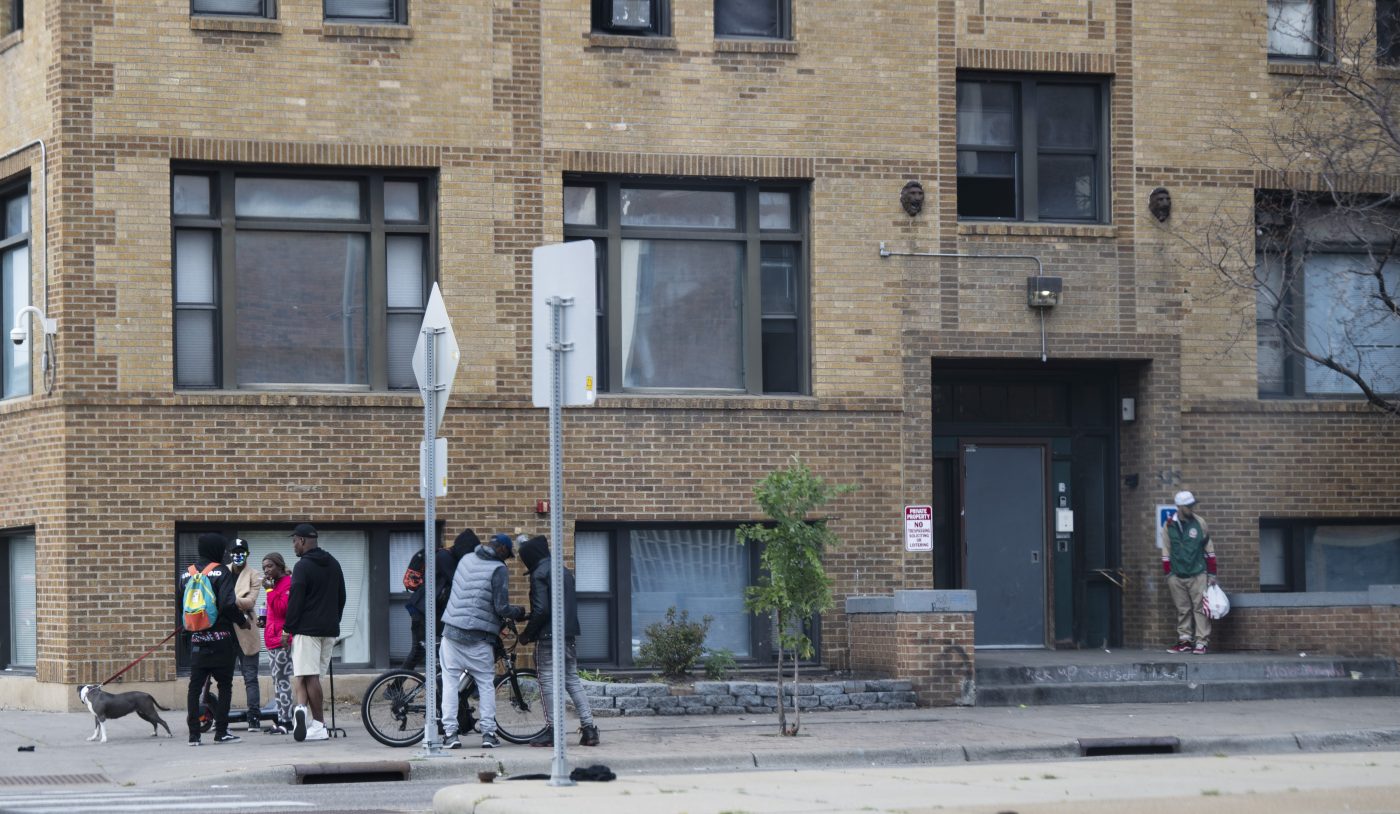
St. Paul: Neighborhood pushback against ‘housing first’ expansion at Kimball Court intensifies
Andrea Suchy-Shinn has lived near the Kimball Court housing complex on Snelling Avenue in St. Paul for 11 years and owned an apartment complex a few doors down for five years, most of it without incident. That changed as Kimball Court changed.
The Beacon Interfaith Housing Collaborative began moving some of its most difficult-to-house clients into the 76-unit, dormitory-style building at Charles and Snelling avenues during the pandemic under the premise of “housing first,” which holds that addiction treatment and other services should follow housing, and not the other way around.
Since then, a noticeable uptick in loitering, panhandling, litter and open-air, daytime drug use near the same block has alarmed residential neighbors and business owners, as have reports of stolen items being sold in a neighboring parking lot. Authorities have called the area ground zero for the fentanyl crisis, and a major drug distribution point for the northwest corner of the city.
Dennis Gerhardstein, a spokesperson for Ramsey County Attorney John Choi’s office, said Friday that the office has been in touch with the Midway Chamber of Commerce, who had reached out with concerns about the area in late October and “questions about the legal process and the need for solutions.” Choi’s office has asked the St. Paul Police Department to compile police reports for the office to review.
The state public nuisance statute could come into play down the line. “We would be open to discussing its application … if there are no better local abatement options,” Gerhardstein said.
Suchy-Shinn said she has seen many of the worst activities firsthand. Other residents have reported burglaries, drug dealing, gang-related graffiti and gun use, including a shooting at Snelling and University avenues in late October. A neighbor said they were almost stabbed by two men attempting to break into their building. A tenant of Kimball Court told neighbors they were harassed, had a gun pulled on them and got pistol-whipped after they spoke out publicly about conditions inside.
Garbage spills out of a container onto the sidewalk in front of Averhealth on Snelling Avenue, near Kimball Court, in St. Paul on Thursday, Oct. 3, 2024. (John Autey / Pioneer Press)
Residents note people can walk into the property with little issue, and a security guard does not stop or search them. Video taken by a neighborhood resident shows side doors of the property unlocked, with people able to freely enter and exit.
According to history and data collected by Suchy-Shinn and other residents, police calls to the property have quadrupled since Beacon Interfaith purchased Kimball Court in 2010.
The St. Paul Department of Safety and Inspections has received and compiled its own complaints about interior conditions over the years, including excessive dirtiness, heating problems, broken bathroom and kitchen sinks, missing toilets, blood on the walls, drug dealing and prostitution.
Residents, local businesses impacted
Suchy-Shinn said Kimball Court meets the definition of a public nuisance property under Minnesota statutes, which require evidence of prostitution, illegal drugs or unlawful use of a dangerous weapon within a building within the previous 12 months.
On Nov. 7, residents gathered at the Hancock Recreation Center for a community discussion organized by the Hamline Midway Coalition, a neighborhood district council, concerning Kimball Court’s proposed $19 million renovation and expansion, which would add 22 living units. The Hamline Midway Coalition itself has chosen to remain neutral on the topic, though it recently launched a “Stabilize Snelling and University” campaign and its development committee has asked the city to clarify the status of Kimball Court’s housing permit.
Upon completion in 2026, the expanded structure would host 24 efficiency units and 72 single-room occupancy units that share a kitchen. Half of the 98 apartments would be dedicated to rapid rehousing for the recent “high-priority” homeless, and 15 units would be reserved for the disabled. Property Solutions & Services has been the on-site property manager since July 2023, according to a spokesperson for Beacon Interfaith, who noted police calls have become less frequent since their arrival.
Neighbors expressed concern about businesses being pushed out, and said problems used to be concentrated at Kimball Court a few years ago but have since expanded into the surrounding area.
Shelly Kragt said she worried about shops in the area owned by immigrants, as they do not feel safe to run their businesses anymore and are less likely to be able to advocate for themselves. After 100 years in operation, the Holcomb-Henry-Boom-Purcell Funeral Home at Snelling and Charles avenues has been put up for sale.
“This neighborhood represents St. Paul at its absolute best,” said homeowner Seth Cobin, in an interview. “This is what every city council person should want the city to look like, where it’s not uniform. You have every color, every religion, every language being spoken. You have rich, poor, middle class, working class in one neighborhood all pretty much getting along. Why would (the city) say this is the neighborhood we should just write off and let it turn into a slum?”
Beacon Interfaith Asset Manager Ben Clarke said at the forum that the organization has added numerous improvements to Kimball Court, including lights in the alleyway next to the property and a “no trespassing” sign, and they’re planning exterior security cameras.
A challenging ‘housing first’ model
Concerns around Kimball Court have underscored tensions nationally over an increase in homelessness and fentanyl use since the onset of the COVID-19 pandemic in 2020.
Even some progressive advocates eager to see more affordable housing constructed at a time of high housing costs have questioned whether too many services for the homeless have been wedged into too few urban neighborhoods, overconcentrating needs and services while creating imbalance that potentially lends itself to more poverty and drug use. Others have simply accused Beacon Interfaith of poor management.
Still, some say that without prioritizing housing, those needs will only increase.
“Part of why there’s things happening outside is there aren’t enough homes for them. This renovation and expansion actually helps those people make the transition from outside to inside,” St. Paul City Council President Mitra Jalali said at the forum.
The four-story, brick-faced building was constructed in 1926 as the Hamline Hotel and later renamed the Kimball Hotel, which holds at least a small footnote in the run-up to the civil rights era.
In 1947, Black civil rights activist Bayard Rustin staged a sit-in at the hotel until he was provided a room. Beginning around the mid-1990s, the Amherst H. Wilder Foundation ran Kimball Court as deeply affordable housing until it was acquired by Beacon Interfaith in 2010.
In 2022, after Beacon Interfaith adopted its “housing first” model, the nonprofit cycled through four security contractors and multiple property managers before finding on-site staff who had a better handle on what residents described as a deteriorating situation.
Crime incidents
Some nearby homeowners have said efforts to control comings and goings at Kimball Court with more frequent security walk-throughs simply pushed unwanted visitors down the street. In recent weeks, the owners of a shuttered CVS pharmacy and convenience store at Snelling and University avenues surrounded the vacant shop and its sizable parking lot with a chain-link fence; the property had before then sometimes drawn as many as 40 loiterers at a time.
A neighboring parking lot, according to the St. Paul Police Department, has become an illicit market where stolen items are resold after having been taken from neighborhood residents’ yards and garages, or the nearby Midway Target and Cub Foods supermarket. Authorities have reported finding children’s bicycles, musical instruments and tools. DoorDash food-delivery drivers picking up orders from Taco Bell have reported being robbed, according to police.
An incident report filed Sept. 19 by two St. Paul police officers who frequently patrol the area described Kimball Court as “the hub for most of the narcotic traffic” in the western police district, which stretches from Larpenteur Avenue to West Seventh Street and Minnesota 280 to about Dale Street. “As soon as squads leave the area, dozens of unsheltered individuals line up waiting outside the building to buy and sell narcotics.”
Officers wrote that they’ve seen individuals who do not live at Kimball Court exit the Snelling Avenue light-rail station wearing backpacks, enter Kimball Court, and leave minutes later without the backpacks. Within minutes, other visitors arrive outside the building, break into groups and then leave.
“I’ve stopped several of these groups outside in the alleys … and removed fentanyl from them, or caught them smoking it,” one of the officers wrote.
City council backs major expansion
Rather than seek punitive measures against Beacon Interfaith, the St. Paul City Council last month offered financial support toward Kimball Court’s expansion.
At the urging of Jalali, who lives in the area, the council on Oct. 10 approved a project labor agreement and $3.35 million in federal American Rescue Plan Act loan funding to help Beacon Interfaith grow the complex from 76 to 98 units. Terms of a $500,000 HOME loan, which the city issued to Kimball Court in 2010, were also extended.
Suchy-Shinn said she compiled 35 comments from neighbors asking for the financing to be denied.
Additional financial backing comes from the Minnesota Housing Finance Agency, Ramsey County and the Metropolitan Council.
As part of the $19 million project, the vacant Star Market convenience store to its north will be torn down in December to make room for an addition to the 1926 structure, said Clarke. About one-fourth of all clients would have their housing largely paid for by federal Section 8 housing vouchers provided through the St. Paul Public Housing Authority, and an arrangement with the Red Lake Nation would provide housing for homeless tribal members. Other housing support services are awarded through Ramsey County.
An architectural rendering of the proposed expansion of Kimball Court, currently a 76-unit “permanent and supportive” housing development at 545 N. Snelling Ave. in St. Paul. (Courtesy of Beacon Interfaith)
According to Beacon Interfaith, the additional space would lend itself to more security, more oversight and more services. Among the planned building changes, an existing ingress will be repositioned as an egress, and a new entrance in the addition will connect directly by stairway to a security desk.
A community room will allow for resident town halls, and additional space would allow for better coordination between property management and support services. The rehab of the existing structure will add a new roof and windows, as well as an internal courtyard, which could offer an alternative to loitering on the sidewalk.
“The renovation funding actually allows the building to operate more safely than it currently does,” Jalali said at the forum. “It changes the way you can enter and exit the building. It closes off the access points that were previously creating unsafe situations for people in the neighborhood and also for the people who live there, who are also our neighbors.”
Beacon Interfaith maintains that adding living units will make Kimball Court’s finances more sustainable, helping to pay for 24/7 security, including a security guard and cameras, as well as four case managers who will be on-site daily.
Suchy-Shinn said most neighbors do not have a problem with Kimball Court’s “housing first” model — they just want to see better management of the building, for both the good of the neighborhood and the tenants living inside the property.
“I have no problem with low-income housing,” Cobin said. “I don’t have any problem with housing for the newly homeless for helping people get off the streets. I don’t have any problem living near drug treatment facilities. I have a major problem with what’s going on here.”
Related Articles
Federal Reserve’s likely slowdown in rate cuts could disappoint borrowers
St. Paul City Council delays vote again on funding ‘Familiar Faces’ rooming house conversion
Eagan council vote makes way for housing, towering logistics building at former Thomson Reuters campus
Funding, zoning questions dog St. Paul ‘Familiar Faces’ homeless project on Marshall Avenue
Remodel or move? How to decide


